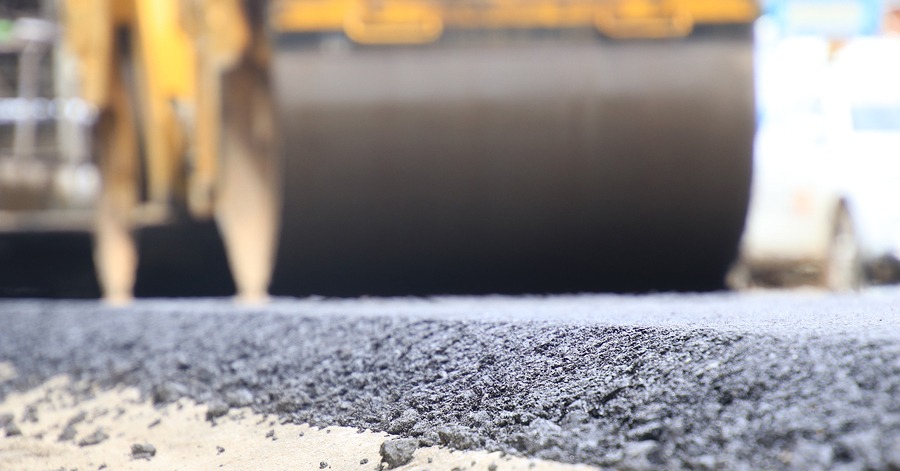When it's time to install a new driveway, there are a variety of materials from which you can choose. These include oil and stone, poured concrete, brick pavers and gravel, among others. One of the top choices on Long Island is asphalt. In the list below, you'll discover five of the properties of asphalt that make it the best material for your driveway.
Flexibility
Driveways go through a lot of changes in their lifetimes. Sometimes they carry heavy loads, and other times they bear no loads at all. In fact, it's common for one side of the driveway to be holding a heavy car while the opposite side is empty.
The foundation of a driveway may settle over time, causing the material above to shift as well. Plus, in many areas of the country, asphalt is exposed to different temperatures throughout the year. When the ground freezes, it expands, putting pressure on the driveway above it.
For both of these reasons, driveway materials must be flexible. They need to be able to bear up under heavy or uneven loads without buckling, and they also require the ability to respond to shifts in the underlying ground.
Asphalt is a good choice for driveways because it has natural flexibility. This building material is made of a liquid binder, also known as asphalt cement, that's mixed with solid aggregates. It hardens as it dries, but it still retains an element of flexibility. When deciding on asphalt, always use a professional asphalt company who can provide this guidance.
Strength
Flexibility isn't the only characteristic that allows a driveway to stand up under heavy loads. The surface also needs to be strong. Otherwise, it will collapse — perhaps little by little, perhaps all at once.
The strength of an asphalt driveway comes largely from its foundation. A quality asphalt surface rests on a properly prepared subbase. Before any materials are laid, the soil beneath must be thoroughly rolled and compacted. The more tightly it is pressed down, the less it will shift over time.
Strength doesn't stop with the subgrade. Next is a layer of base, which on Long Island is typically a recycled concrete blend followed by 2” of asphalt. The layers should be sufficiently compacted during installation which will lead to a strong finished product.
Durability
Your driveway can't be strong only for the short-term. That would be a poor investment. You need a material that will hold up to year-after-year use.
Asphalt's durability makes it a great choice for a long-lasting driveway. There's a good chance that you can get 15 to 20 years out of an asphalt driveway that's been properly laid using a strong subbase and quality materials. Keeping up with regular maintenance is another key to getting many years out of your driveway.
Actually, the maintenance options available for asphalt driveways have a lot to do with why they're so durable. You can keep your driveway looking good for years with the following techniques:
By using these techniques to guard against asphalt damage or perform repairs as needed, you can keep your asphalt looking great and working well for years.
Water Resistance
Impermeability is a great property for driveways to have. Surfaces that let in water expose the subgrade to unnecessary moisture. This underground water can slowly erode the foundation of your driveway.
Additionally, when the weather turns cold, the water in the ground will freeze and expand. When it later thaws, the subgrade will contract again. This cycle of expansion and contraction can place stress on your driveway.
Choosing a material like asphalt will reduce the amount of water that seeps through the surface. No driveway material is 100% impermeable, but properly laid asphalt does a good job of keeping out most moisture.
The secret to asphalt's water resistance is excellent compaction. When heavy machinery is used to press down the fresh asphalt as much as possible, it reduces the number of air voids that remain in the material. Without these gaps, it's much harder for water to work its way in.
Regular asphalt sealcoating helps as well. By filling in the hairline cracks that can develop over time, this practice restores asphalt's ability to keep out water.
Texture
Your driveway should be smooth enough that it looks nice and provides a steady walking surface, but you also want it to have enough texture to provide traction. Not only is traction good for helping your car stop on a slick day, but it also helps you keep your footing when you're getting out of your vehicle on a snowy day.
Asphalt is an ideal material for achieving this balance because of the variety of aggregates that are available.
You can see an overview of aggregate choices in the following video:
Larger aggregates increase traction, and smaller aggregates lend to a smoother surface. A mix made of midsize aggregates with rough angles can be particularly good for creating a durable surface with just the right amount of texture.
The best aggregates for your property may be different, however. Your paving contractor can lend insight into the right materials for your asphalt driveway.
Why should you choose asphalt for your driveway? This material is flexible, strong, durable, water-resistant and good for traction. To learn more about the properties of asphalt or get started with your driveway project on Long Island, reach out to the pros at PALERMO PAVING.

